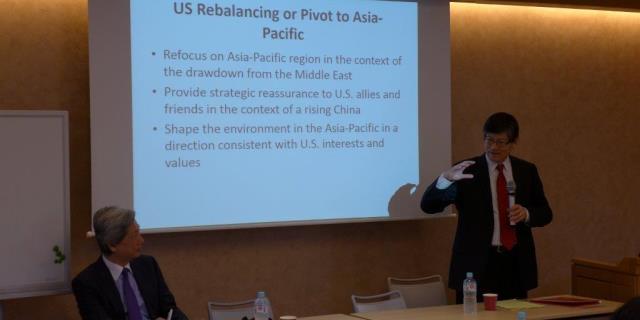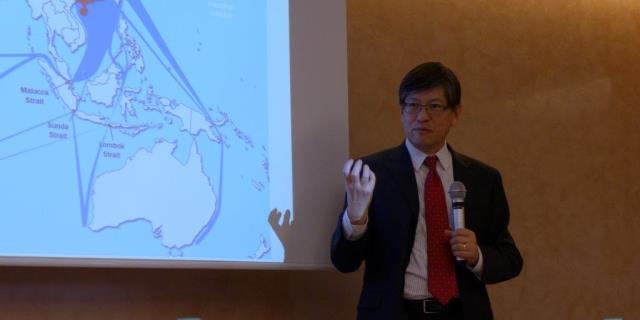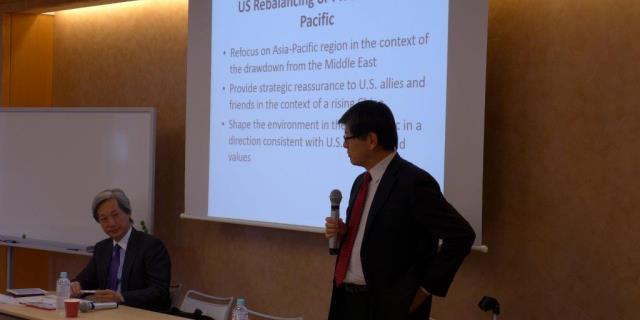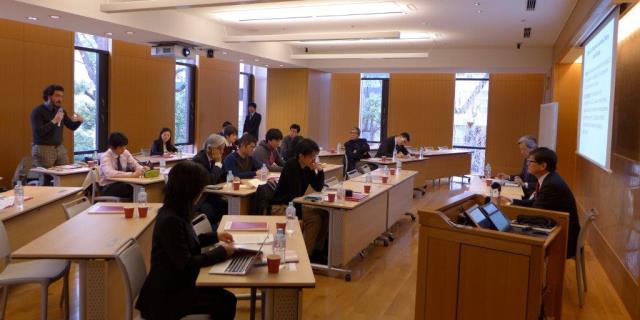SSU Forum with Professor Mike Mochizuki
| Date: | Friday, March 14, 2014 10:30-12:00 |
|---|---|
| Venue: | Seminar Room, 3rd Floor, Ito International Research Center |
| Subject: | “The US Rebalance Towards Asia: Implications for Japan-China Relations” |
| Lecture: | Professor Mike Mochizuki (Professor at the Elliott School of International Affairs of The George Washington University) |
| Language: | English |
The SSU was honoured to host Mike Mochizuki, Professor at the Elliott School of International Affairs of The George Washington University, who delivered a talk in the framework of the SSU Forum on March 14, 2014, under the title “The US Rebalance Towards Asia: Implications for Japan-China Relations”.
Professor Kiichi Fujiwara, Director of the SSU, acted as chair of this Forum. He introduced Professor Mochizuki remembering his outstanding contribution to the study of Japanese foreign policy, particularly on his analysis of the political issue surrounding the possible re-location of US military bases in Okinawa.

Professor Mochizuki started his talk by expressing his pleasure to see the Hongo Campus of the University of Tokyo after many years. Coming to the discussion of the US rebalance towards East Asia, professor Mochizuki began with an analysis of the common “realist” account of the current East Asian international political situation. Many realist narratives emphasize the decline of US military primacy in the East Asian region as China rises. However, Professor Mochizuki noted that notwithstanding this realist narrative, China is still not in the position of acquiring military supremacy, thus replacing the US as regional hegemon, in the near future. The greatest challenges are now not of a military nature, but largely political.

Again in a conventional realist perspective, the US and Japan are expected to balance against a rising China by tightening their bilateral alliance. According to John Mearsheimer's offensive realism, one should expect that China will seek regional hegemony, but Mearsheimer recommends an American strategy that diverges from the U.S. rebalance pursued by the Obama Administration. He advocates that the US should shift to an “off-shore balancing” by moving away from its current forward deployment on military forces in the region and its direct defence of the allies. Mearsheimer argues in fact that offering direct protection by means of a forward military presence generates a free riding opportunity in terms of security to East Asian states, while at the same time representing a burden for the US.

However, even within the realist tradition, there are different interpretations of East Asian military postures and their future. The US has so far not followed Mearsheimer's advice to retreat. Quite the contrary, Washington is considering an increase in U.S. naval capabilities and an upgrade of military hardware, albeit it is likely that the reduction in the absolute number of deployed troops (now about 50% of the year 2000 level) will continue. The United States is also interested in having its allies and friends contribute more to common security objectives. In the case of the US and Japan, the alliance must be carefully managed to avoid the two possible extremes of entrapment and abandonment, by having a clear picture of different priorities as well as overlapping interest and values. This is especially important considering that there may be many “grey areas” of low-intensity conflict, whose management has to be coordinated within the alliance but which should be handled primarily by Japan. Professor Mochizuki emphasized that at a time when China's long-term strategic intentions are uncertain, the United States and Japan must carefully coordinate its defence policies to mitigate possible alliance security dilemmas.

-
Elliott School of International Affairs, The George Washington University
